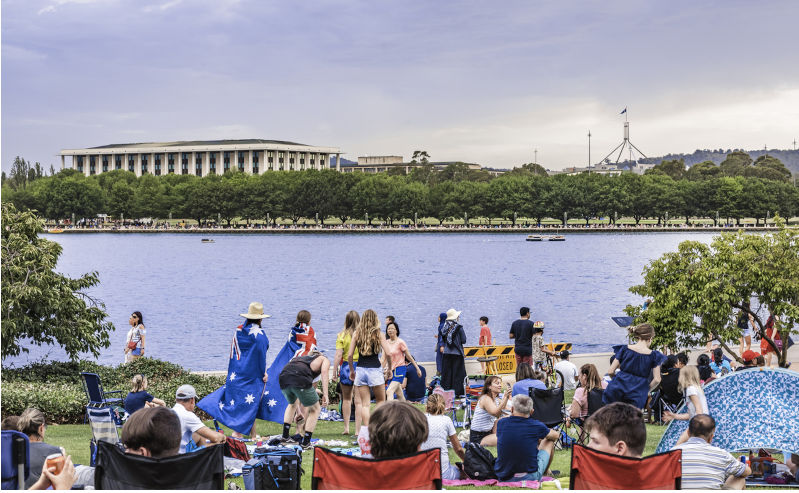That we live in one of the best contemporary democracies is to be appreciated.
That we have managed to maintain a high level of employment while bringing down inflation is to be appreciated.
A soft landing is so much better than a hard landing.
Once upon a time, I worked as an economist – tutoring macro and monetary economics at an Australian University; contributing also to a family trading firm, and so on. This and the years thereafter gives me an appreciation of our nation, including of our economy.
During budget week I have been in Canberra.
The matters that took me there are reasons for further appreciation.
One is quite personal. High-quality human beings in government are helping some folk I know obtain citizenship. This is after years on temporary visas, in a kind of endless waiting room existence of uncertainty.
When Minister Tony Burke says he has fought racism and bigotry for his entire career, I am one of many who knows this is true.
Another reason for being in Canberra is a partnership to help ensure that during their education, our young people gain knowledge and respect for the diverse world views of our Multifaith Australia. The point of this is two fold: both to enhance appreciation of neighbours, and also to equip our young people with quality resources to help protect them from the propaganda of divisive extremists.
We are home to the oldest continuing culture, and are such a wonderfully diverse nation. We are together as a kind of island version of the whole human family. We have such potential to give hope to others overseas as to how humankind can flourish together.
This potential is so much easier to fulfil in a functioning democracy with a healthy economy. The poets say “humanity is a family that has barely met”. In Australia, we can all meet and make friends. The quality of our relationships is key. When our relationships are full of understanding and warmth, we feel so much happier. Any initiatives that help relationships be more giving and forgiving are good.
Hence the importance of these educational initiatives as well as others to enhance “social cohesion“. Leadership is key. Leadership that seeks to unite, and never divide.
The holy days ahead coincide with the election campaign. We will be praying and meditating for the safety and peace of all candidates. Our leaders will be in many public places and we know there are increased risks, as reported by the Australian Federal Police.
In one conversation in Canberra, a well-connected Australian discussed members of the current federal Parliament, affirming those of every party he knows would never intentionally cause harm to others.
The CSU Democracy Audit says we expect our parliamentarians to be people of integrity, with empathy, and with the skills to deliver what really helps our lives.
As an Audit author suggests, when there is an opportunity in the upcoming election campaign, we should ask candidates:
“What will you do to strengthen our democracy?”
Assuming, we pray, they are all resolved to behave as people expect – with integrity, empathy, and a readiness to do helpful things.
Our democracy is not in crisis, but the audit conveys a potentially serious decline of trust in governments. A key reason is poor communication. The issue is not “democracy”, but rather the unpleasant and divisive nature of political discourse.
Our economy is not in crisis either, but the level of debt is dangerous, given the nature of future uncertainties.
One of these is the mounting cost of climate change. Another reason for being in Canberra was for discussions with some of those helping Australia make our best contribution at upcoming meetings of the United Nations Framework Convention on Climate Change.
With multilateralism rather diminished by various factors and personalities, our persistent efforts to implement the Paris Agreement are more important than ever.
The very fact of this Paris Agreement is credited with containing the rise in global temperatures below what would otherwise already be the case.
Multilateral co-operation works. Nonetheless, it is not working fast enough. We may soon have reached the 1.5 degrees which the Paris Agreement hopes is the ceiling.
I heard in Canberra, if business continues as now prevails, the rise in temperatures will be at five degrees by the end of this century. The planet will then be uninhabitable. We would have destroyed all that we treasure, by selfish stupidity.
It is crucial that we continue the transition away from the fossil fuels which are heating our planet.
If the next UNFCCC meeting this June in Bonn resolves that Australia, with the Pacific nations, will host UNCOP31 in 2026, we will have a wonderful opportunity to offer global leadership.
In this context,it is distressing to note the Leader of the Opposition is resolved against this opportunity.
This is a step away from multilateralism at the worst possible time.
In summary,what we need is unifying leadership that gives loving hope and creates new possibilities.
Next Sunday’s Gospel includes Jesus’ famous saying, “Let anyone who is without sin be the first to throw a stone. [John 8.1-11]”
The context is one in which some are wanting him to justify violence against someone who seems to have made a mistake.
We all make mistakes. We all need each other’s understanding more than condemnation. We need peacemakers, not more violence!
Given all that we have to appreciate about being together here in Australia, an election campaign that is safe for all and is conducted in a charitable spirit would be so uplifting!
As the saying goes, “Hope springs eternal!”

Philip Huggins
Bishop Philip Huggins Director, Australian Centre for Christianity and Culture, August 25 2022
